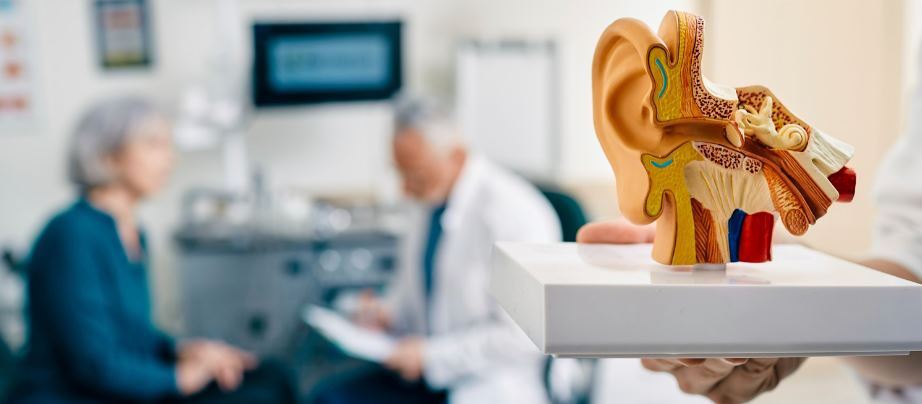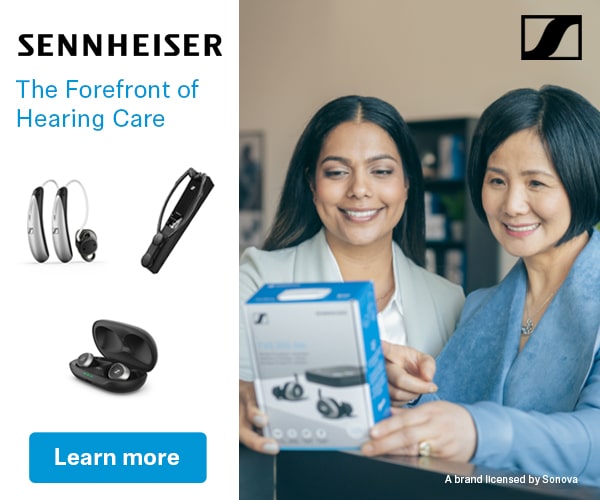by Michael Piskosz & Bill Schiffmiller
An audiologist and a hearing aid user walk into a bar. They sit down, order a drink, and begin to chat about all things noise, sound, and hearing. The conversation quickly shifts to auditory healthcare, a topic both are intimately familiar with but from vastly different perspectives.
Michael, the audiologist and a seasoned professional, talks about the present and future challenges of the field. At the same time, Bill, the hearing aid user, shares personal experiences of navigating life with hearing loss. This casual bar chat, though seemingly ordinary, highlights the need for a new approach to auditory healthcare.
Michael and Bill discuss Lifelong Sound Health™, an approach that transcends mere hearing aid devices and addresses the auditory wellness needs of all generations.
Out With the Old. In With the New.
A New Approach to Auditory Healthcare
For too long, auditory healthcare has narrowly focused on hearing aids as the primary solution to hearing loss. While hearing aids are precious to users (AKA, the patient), and create revenue for audiologists and manufacturers, this singular focus overlooks the broader spectrum of auditory wellness, putting the hearing healthcare industry in a precarious position. Should market dynamics shift slightly, it could have profound ripple effects on its businesses.
To help mitigate this, the future of auditory health should encompass not only the treatment of hearing loss but also areas of prevention, education, consumerism, and support across all age groups. It also helps the highly prized younger cohorts enter their hearing healthcare journey with relevant entry points, not hearing aids.
This new approach, called Lifelong Sound Health™, understands that modern life is rife with auditory challenges – from the constant barrage of disruptive and unwanted noise to the growing usage of personal audio device among all generations. These factors contribute to auditory issues that affect people long before they reach the typical age for hearing aid use.
Lifelong Sound Health™ includes proactive measures to protect and maintain auditory wellness from an early age. It attracts younger audiences by understanding their consumer needs and how audiology can align and integrate those products and services.
Stuck In the Mud
The Stagnant Growth of Audiologists
Despite the increasing demand for auditory health services, the number of incoming audiologists has remained relatively flat for years. Since 2018, the growth rate of audiologists has been 0%*. This growth rate does not align with the burgeoning need for auditory healthcare services, especially given the aging population and the prevalence of auditory wellness needs among younger individuals.
The shortage of audiologists poses a significant challenge to the auditory healthcare industry. As the number of individuals with hearing loss and auditory wellness needs increases, the demand for services will only intensify. In fact, the WHO reports that by 2050 there will be 3.5 billion people on earth with hearing loss, which triples the amount today**. This discrepancy will exacerbate pain points such as longer appointment wait times, reduced access to care in underrepresented areas, and lower quality of services as other less-qualified players look to take advantage of financial opportunities on uneducated consumers.

This also creates opportunities for forward-thinking companies to leverage innovative technologies, like AI and large language models, to help automate many audiology-based services, such as evaluations, instrument fittings, and follow-up counseling. These innovative automation platforms create greater competition and potentially fewer customers for you.
Stop Squeezing the Square into the Circle
Meeting Younger Generations Where They Are At
For decades, the hearing healthcare industry has tried to attract younger cohorts by using photos of younger people, making language hipper, and other cliché generational grabs that have proven unsuccessful again and again.
The reality is that younger generations are not attracted to hearing aids, as most do not need them and prefer to focus on their immediate needs rather than concerns about their auditory health later in life. These tech-savvy individuals are heavily engaged with audio devices like headphones and earbuds, making it crucial for them to use these devices carefully and responsibly to preserve their auditory health.
This shift in focus presents a unique opportunity for audiologists to pivot and become the go-to audio experts for the younger demographic. By selling consumer audio products and offering service packages and education on their proper use, audiologists can help younger consumers understand how to protect their hearing while enjoying their favorite audio experiences.
On the other hand, working families often prioritize mitigating noise to reduce disruptions, ensuring they can sleep well, perform optimally, and manage their daily responsibilities effectively. For these families, auditory health focuses on creating a peaceful, functional environment rather than addressing hearing loss directly. Audiologists can extend their expertise beyond hearing aids by offering solutions that improve these busy households’ overall quality of life.
By embracing forward-thinking approaches like Lifelong Sound Health™ and expanding their role to encompass a broader range of auditory health services and products, audiologists will address the evolving needs of younger generations and working families, solidifying their position as comprehensive noise, sound, and auditory health experts. By doing so, they create greater audience reach and additional revenue sources, relying less on the fragile conventional hearing aid sales model.
As Michael and Bill finish up and wait to close their tab, they both ponder: “Could this be a reality, or is it the alcohol talking?”
*Statista: https://www.statista.com/statistics/670139/audiologists-number-in-the-us/
**World Health Organization. (2021). The World Report on Hearing (WHR), https://www.who.int/publications/i/item/world-report-on-hearing
About the Authors
Bill Schiffmiller is Founder and CEO of Akoio®, a premier auditory wellness company. Bill’s experience includes serving as the former Leader of Accessibility Initiatives at Apple, Inc. In this role, he developed inclusive and accessible solutions integrated into Apple’s global corporate and retail operations. His work in advocacy, customer service, and experience significantly enhanced the Apple brand, setting new standards for accessibility. Bill, a lifelong hearing aid user, is driven by a humanistic philosophy and a commitment to positively impacting lives through sound management and accessibility solutions. His mantra, “Lifelong Sound Health for all,” reflects his dedication not only to those with hearing loss but to everyone.
Michael Piskosz is Director of Research and Client Relations at Akoio®. With over 25 years of experience in the hearing aid manufacturing and audiology industries, Michael has dedicated his career to identifying consumer needs, developing products and services to meet those needs, and driving innovation through creativity and ideation. He deeply desires to transform auditory health, stepping away from conventional limitations and unlocking the vast array of opportunities the industry currently overlooks. Michael’s work is driven by a commitment to improving lives through innovative auditory health solutions, blending technical expertise with a deep understanding of human behavior to create impactful products and services.







